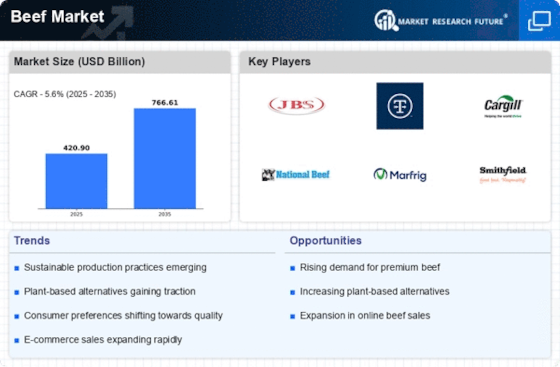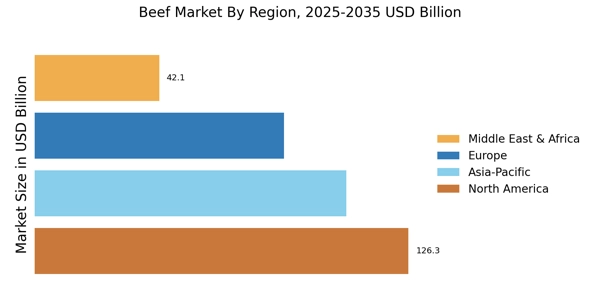Global Trade Dynamics
The Beef Market is significantly influenced by global trade dynamics, which affect supply and pricing structures. Trade agreements and tariffs can alter the competitive landscape, impacting both domestic and international markets. For example, recent trade negotiations have opened new markets for beef exports, particularly in regions with growing middle-class populations. This expansion presents opportunities for producers to increase their market reach and revenue. However, fluctuations in trade policies can also pose challenges, as they may lead to price volatility and supply chain disruptions. Understanding these dynamics is essential for stakeholders in the Beef Market to navigate the complexities of international trade.
Evolving Consumer Preferences
In the Beef Market, evolving consumer preferences are reshaping purchasing behaviors. There is a marked shift towards plant-based diets and alternative protein sources, which has prompted traditional beef producers to reconsider their strategies. While beef remains a staple in many diets, the rise of flexitarianism—where consumers reduce meat consumption without eliminating it entirely—has led to a diversification of product lines. Data suggests that nearly 30% of consumers are actively seeking meat alternatives, which could influence the Beef Market to innovate and incorporate hybrid products that blend beef with plant-based ingredients. This adaptation may be crucial for maintaining market share in an increasingly competitive landscape.
Health and Nutrition Awareness
Health and nutrition awareness is increasingly shaping consumer choices within the Beef Market. As individuals become more health-conscious, there is a growing emphasis on the nutritional benefits of beef, such as its high protein content and essential vitamins. This trend is reflected in market data, which indicates that lean beef products are gaining popularity among health-focused consumers. Additionally, educational campaigns highlighting the role of beef in a balanced diet are likely to bolster demand. The Beef Market may need to enhance its marketing efforts to effectively communicate these health benefits, thereby appealing to a broader audience and countering the rise of alternative protein sources.
Rising Demand for Premium Beef
The Beef Market is currently experiencing a notable increase in demand for premium beef products. Consumers are increasingly seeking high-quality, grass-fed, and organic beef options, which are perceived as healthier and more sustainable. This trend is driven by a growing awareness of food quality and sourcing, as well as a shift towards more discerning eating habits. According to recent data, the premium beef segment has seen a growth rate of approximately 5% annually, indicating a robust market potential. As consumers become more educated about the nutritional benefits of premium beef, the Beef Market is likely to adapt by enhancing product offerings and marketing strategies to cater to this evolving consumer preference.
Technological Innovations in Production
Technological advancements are playing a pivotal role in the Beef Market, particularly in production and supply chain management. Innovations such as precision agriculture, genetic improvements, and enhanced breeding techniques are contributing to increased efficiency and sustainability. For instance, the implementation of data analytics in livestock management has shown to improve feed conversion rates and reduce waste. Furthermore, advancements in meat processing technology are enhancing product quality and safety, which is paramount in meeting consumer expectations. As these technologies continue to evolve, the Beef Market is likely to witness a transformation that not only boosts productivity but also aligns with sustainability goals.

















